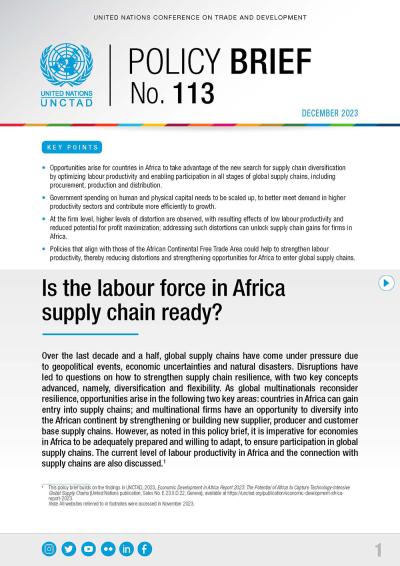
Over the last decade and a half, global supply chains have come under pressure due to geopolitical events, economic uncertainties and natural disasters. Disruptions have led to questions on how to strengthen supply chain resilience, with two key concepts advanced, namely, diversification and flexibility.
As global multinationals reconsider resilience, opportunities arise in the following two key areas: countries in Africa can gain entry into supply chains; and multinational firms have an opportunity to diversify into the African continent by strengthening or building new supplier, producer and customer base supply chains. However, as noted in this policy brief, it is imperative for economies in Africa to be adequately prepared and willing to adapt, to ensure participation in global supply chains.
The current level of labour productivity in Africa and the connection with supply chains are also discussed.
Key points:
- Opportunities arise for countries in Africa to take advantage of the new search for supply chain diversification by optimizing labour productivity and enabling participation in all stages of global supply chains, including procurement, production and distribution.
- Government spending on human and physical capital needs to be scaled up, to better meet demand in higher productivity sectors and contribute more efficiently to growth.
- At the firm level, higher levels of distortion are observed, with resulting effects of low labour productivity and reduced potential for profit maximization; addressing such distortions can unlock supply chain gains for firms in Africa.
- Policies that align with those of the African Continental Free Trade Area could help to strengthen labour productivity, thereby reducing distortions and strengthening opportunities for Africa to enter global supply chains.
This policy brief builds on the findings of the UNCTAD Economic Development in Africa Report 2023: The Potential of Africa to Capture Technology-Intensive Global Supply Chains


